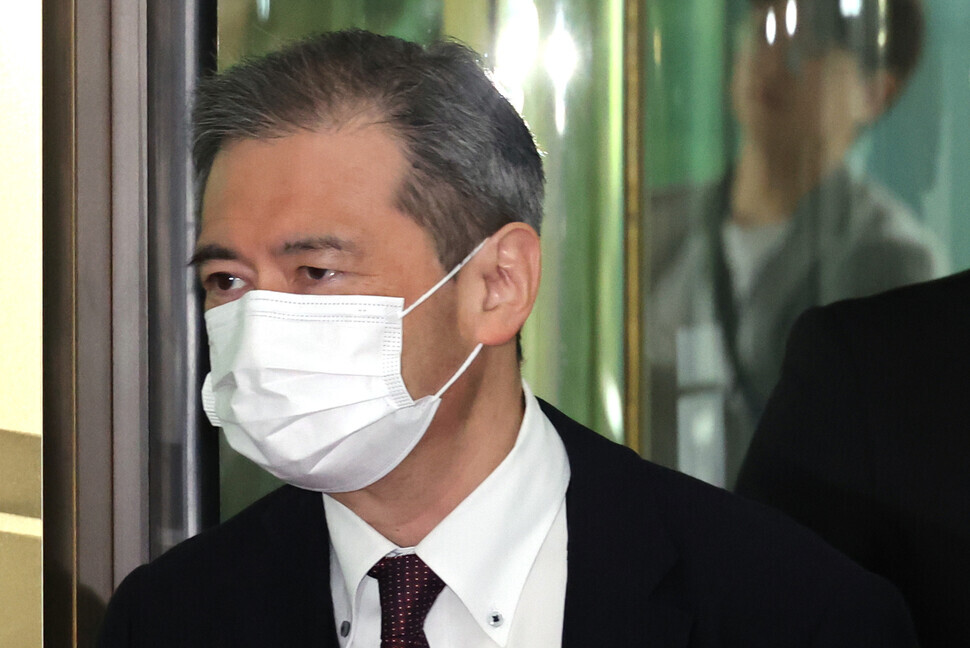hankyoreh
Links to other country sites 다른 나라 사이트 링크
[Editorial] As it bolsters its alliance with US, Japan must be accountable for past

Japan has once again reiterated its false sovereignty claim on the Dokdo islets in its annual diplomatic policy bluebook. In addition, it maintained its position that it “deeply regrets and cannot accept” the Korean court rulings that Japanese companies should compensate the Koreans they used for forced labor.
For the sake of peace and stability in East Asia as a whole, Japan must look back on its history and the wrongdoings it has committed in the region, remain apologetic and reflect on its misdeeds.
According to the 2024 diplomatic bluebook released by the Japanese Ministry of Foreign Affairs on Tuesday, Japan has continued to claim that the South Korean territory of the Dokdo islets is “Japan’s sovereign territory” and is being “illegally occupied” by South Korea.
It also regurgitated its refusal to accept South Korean Supreme Court rulings on compensation for victims of forced labor, which remains the most contentious issue between Japan and South Korea.
Even more concerning than the annual spat over Japan’s bluebook is how Japan’s historical awareness has retreated drastically since former Prime Minister Shinzo Abe’s statement in 2015, which dismissed several issues existing in diplomatic relations between Japan and South Korea and took a tone of leaving the past in the past.
Instead of making a straightforward statement of apology for Japan’s colonial history and aggression, as was expressed in the 1995 statement by Prime Minister Tomiichi Murayama, the Japanese government is vaguely maintaining that “the Japanese government inherits, as a whole, the positions of previous cabinets on historical recognition.” This demonstrates a cowardly refusal to take responsibility for Japan’s actions as a historical aggressor.
The recent augmentation of the US-Japan alliance into a global one, expanding Japan’s military role, also makes Japan’s regressive historical awareness even more concerning.
At the US-Japan summit on April 10, the two countries declared that they are “global partners for the future” and that they will “bilaterally upgrade [their] respective command and control frameworks to enable seamless integration of operations and capabilities and allow for greater interoperability and planning between US and Japanese forces.”
A stronger and more unified US-Japan alliance is likely to exert greater military pressure on China in the Indo-Pacific region. If Japan continues to refrain from reflecting on its history, no amount of rhetoric emphasizing the importance of law and rules will sway China.
Japan’s Self-Defense Forces (JSDF) have recently shown extremely disturbing behavior, such as mass visits to the Yasukuni Shrine, a symbol of the war of aggression, and the use of the phrase “Greater East Asia War” on social media to justify Japan’s past invasions of its Asian neighbors.
Even some Japanese media outlets are expressing concern, with the Asahi Shimbun reporting on Saturday that “We are deeply concerned that these episodes may indicate a fading commitment by the SDF to reflect on dark chapters of the nation’s history.”
Japanese Prime Minister Fumio Kishida should seriously consider whether the Japanese government’s lax commitment to repenting for the country’s history has affected the behavior of the JSDF. In Seoul, the Yoon Suk-yeol administration should also be resolute in pointing out Japan’s faults, if only for the sake of the continued development of bilateral relations.
Please direct questions or comments to [english@hani.co.kr]

Editorial・opinion
![[Guest essay] Maybe Korea’s rapid population decline is an opportunity, not a crisis [Guest essay] Maybe Korea’s rapid population decline is an opportunity, not a crisis](https://flexible.img.hani.co.kr/flexible/normal/500/300/imgdb/original/2024/0430/9417144634983596.jpg) [Guest essay] Maybe Korea’s rapid population decline is an opportunity, not a crisis
[Guest essay] Maybe Korea’s rapid population decline is an opportunity, not a crisis![[Column] Can Yoon steer diplomacy with Russia, China back on track? [Column] Can Yoon steer diplomacy with Russia, China back on track?](https://flexible.img.hani.co.kr/flexible/normal/500/300/imgdb/original/2024/0430/1617144616798244.jpg) [Column] Can Yoon steer diplomacy with Russia, China back on track?
[Column] Can Yoon steer diplomacy with Russia, China back on track?- [Column] Season 2 of special prosecutor probe may be coming to Korea soon
- [Column] Park Geun-hye déjà vu in Yoon Suk-yeol
- [Editorial] New weight of N. Korea’s nuclear threats makes dialogue all the more urgent
- [Guest essay] The real reason Korea’s new right wants to dub Rhee a founding father
- [Column] ‘Choson’: Is it time we start referring to N. Korea in its own terms?
- [Editorial] Japan’s rewriting of history with Korea has gone too far
- [Column] The president’s questionable capacity for dialogue
- [Column] Are chaebol firms just pizza pies for families to divvy up as they please?
Most viewed articles
- 1Under conservative chief, Korea’s TRC brands teenage wartime massacre victims as traitors
- 2Months and months of overdue wages are pushing migrant workers in Korea into debt
- 3First meeting between Yoon, Lee in 2 years ends without compromise or agreement
- 4[Guest essay] Maybe Korea’s rapid population decline is an opportunity, not a crisis
- 5[Column] Can Yoon steer diplomacy with Russia, China back on track?
- 6‘We must say no’: Seoul defense chief on Korean, USFK involvement in hypothetical Taiwan crisis
- 7After election rout, Yoon’s left with 3 choices for dealing with the opposition
- 8Dermatology, plastic surgery drove record medical tourism to Korea in 2023
- 9[Column] Behind factional animus of Korean politics, victim mentality festers
- 10[Exclusive] Hanshin University deported 22 Uzbeks in manner that felt like abduction, students say